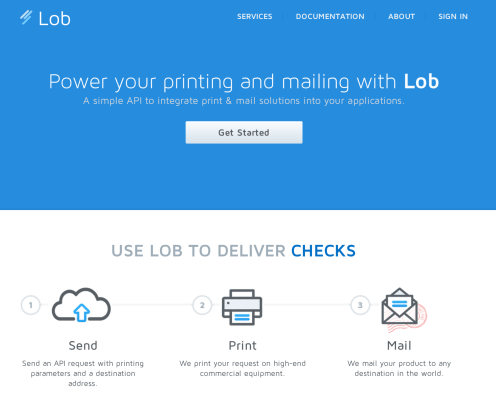This summer, the Y Combinator-backed startup Lob launched a new developer API which lets companies easily integrate printing and shipping services into their applications. Today, the company is announcing $2.4 million in seed funding from various YC partners and angel investors. Participating in the round were Kevin Hale, Dalton Caldwell, Sam Altman, Joshua Schachter, Alexis Ohanian, Paul Buchheit, Garry Tan, Polaris Partners, and other undisclosed investors.
With Lob, whose early adopters include CrowdTilt, ZenPayroll, LendUp, LocalOn, and others, developers can automate or print a variety of products on demand, including postcards, photos, flyers, posters, bills, checks, invoices, and more.
The company says it now has over 1,000 paying customers, and just hit $40,000 in revenue at the end of last month. It has also printed a million dollars worth of checks. On the horizon, there’s the potential for Lob to grow even larger, with now two Fortune 500 companies testing the service on a smaller scale. If those trials come to fruition, they could be multi-million dollar deals, the founders tell us.
A graduate of Y Combinator’s summer 2013 program, Lob was started earlier this year by University of Michigan grads Harry Zhang and Leore Avidar. Zhang had been inspired to create the service after previously working as a product manager at Microsoft, where he saw the difficulties involved with customer mailings – the company had interns stuffing envelopes in a mailroom for weeks, at times.
Today, Lob’s use cases go beyond your typical printed materials, like postcards, invoices or promotional mailings, for example. The company already offers tools like address verification, and “Smart Packaging” (where it picks the best packaging type automatically), and now it’s also working to enable printing of other products, too, including photo albums/photo books, and even t-shirts and mugs. Longer term, the team is considering moving into physical books as well, given customer demand.
“When we think of printed products, it’s anything that ink can touch,” explains Zhang. He wants Lob to be a one-stop shop where companies can manage all their printings. And although it’s still early days, the solution is growing in popularity. Customers generally come in with a single request, but then realize how they can use Lob in other areas, too. Today, almost every customer is using two products at the minimum, even though over half had arrived seeking just a single solution.
The team was also surprised to see international sign-ups, given its U.S. focus, with customers arriving from South America, Europe, Asia and Australia, then opting to have Lob print and ship items overseas. “A lot of international companies don’t have local ways to do this, so they’re willing to pay a little more,” Avidar says.
In terms of its pricing, Lob has been competitive, but maybe not the cheapest option, though that’s changing as it begins to scale. In a few months’ time, Lob’s pricing will drop by an average of 10% across the board, we’re told. (Some products might not change, while others may drop by as high as 20%-30%, to give you an idea).
But Lob’s advantage hasn’t necessarily been one based just on price – it’s about the model. Competitors have traditionally required businesses to pay large amounts upfront, or even pre-pay for their entire order, but Lob lets its customers pay as you go.
“The fact that it’s a variable expense and you can do everything on a minimum quantity of one – that’s really the differentiator,” says Avidar. “You can’t really go anywhere and say: ‘I want to print one postcard’,” he adds.
With the additional funding, Lob is working to add new product categories and hire engineers to help build out its API. The company wants to double (or more) its four-person team over the next few months, and support for photo albums and t-shirts is arriving soon.
